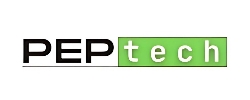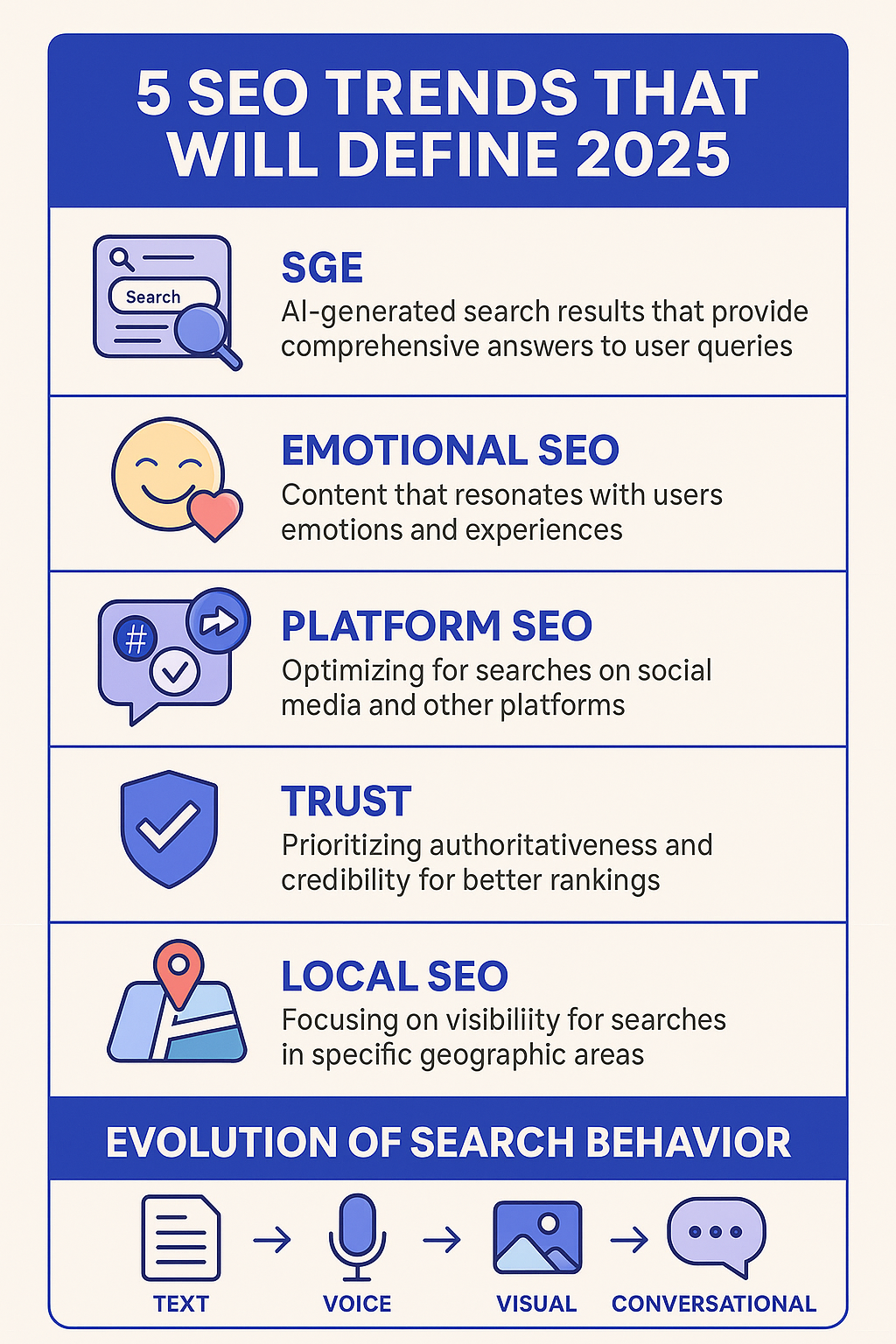
Digital Marketing in 2025: SEO Trends & Strategies for Success
In the ever-evolving world of digital marketing, the only constant is change—and SEO is no exception. As we step deeper into 2025, we’re witnessing a seismic shift not just in how search engines operate, but why users search in the first place. It’s no longer just about ranking higher on Google—it’s about understanding the behaviour, intent, and emotion behind each search. And that makes SEO today as much an art as it is a science.

The Search Engine is Now a Thinking Engine
Five years ago, SEO revolved around pleasing an algorithm—keywords, meta descriptions, backlinks, and structured data formed the foundation. But in 2025, search engines have morphed into something far more sophisticated. Thanks to the rise of generative AI and neural search technologies, Google is no longer a directory—it’s a conversational partner, a predictive oracle, and a learning machine.
Search Generative Experience (SGE) is leading this charge. Instead of displaying a list of blue links, Google now constructs personalized summaries, pulling contextually rich answers from across the web. As a result, the spotlight has shifted from single-page optimization to domain-wide trust and intent-rich ecosystems. Businesses can no longer rely on siloed blog posts or keyword cramming—they must create layered content experiences that anticipate user needs before they’re even typed.
And here lies the paradox: the better Google gets at answering queries on its own, the harder it becomes to earn a user’s click. Welcome to the era of zero-click SEO.
The Invisible Battle for Visibility
Imagine pouring weeks into a detailed, SEO-optimized blog post. It ranks on the first page, but instead of driving traffic, Google scrapes the best lines and presents them in a knowledge panel or featured snippet. No click. No visit. No engagement.
In 2025, zero-click searches aren’t the exception—they’re the norm. This means SEO is no longer just about visibility in the rankings but about visibility within the answer itself. The goal has shifted from winning clicks to winning moments. If your brand is the one providing the punchline to the user’s question—even without a click—you’ve succeeded in building awareness.
Smart brands are adapting by making their content snappier, more quotable, and schema-structured to feed into Google’s machine-learning hungry format. They’re also diversifying beyond traditional blog posts—creating video explainers, interactive tools, and bite-sized educational content designed to get picked up by AI-generated answers.
The old game was about keywords. The new game is about conversations.
Beyond Blue Links: Where SEO Lives Now
It would be a mistake to believe that SEO is confined to search engines. In 2025, SEO spills over into social media, voice assistants, smart TVs, AR interfaces, and even inside apps. A teenager searching for skincare advice might ask TikTok before Google. A busy parent looking for dinner options will ask Alexa. A professional planning their next big purchase might rely on LinkedIn posts or newsletters over search results.
Digital marketing in 2025 is deeply fragmented—and SEO must live wherever search happens.
This is where platform-native SEO becomes crucial. TikTok SEO relies on hashtags, trending sounds, and captions. YouTube’s search dynamics revolve around watch time, video retention, and click-through rate. Even Instagram Reels have their own discoverability logic. Brands that treat SEO as a Google-only game are missing the point. True success in 2025 lies in understanding each platform’s ecosystem and playing to its algorithm, natively and authentically.
- Go to Appearance > Themes in your WordPress dashboard.
- Click “Add New” to browse themes.
- Choose a theme that fits your brand and click “Install.”
- Activate the theme and customize it under Appearance > Customize.
Popular free themes include Astra, OceanWP, and Neve, which are lightweight and customizable. If you want advanced features, premium themes from ThemeForest or Elegant Themes might be worth exploring.
The Rise of Emotional SEO
A fascinating transformation in 2025 is that search engines are increasingly learning to understand tone, sentiment, and emotional weight. Think about it—searches like “feeling overwhelmed by work” or “how to fix my life” don’t have transactional intent. They’re emotional.
Marketers now have a unique opportunity: to build content that not only informs but connects. This shift has birthed what many are calling Emotional SEO. It’s about answering not just what people ask, but why they ask it. It’s about writing with empathy, anticipating fears, and guiding users through not just a digital journey, but a psychological one.
The brands that are thriving in 2025 are those that don’t just rank—they resonate.
Trust Is the New Traffic
In an age where misinformation is rampant and AI can clone anyone’s voice or face, trust has become SEO’s most precious currency. Google’s emphasis on E-E-A-T (Experience, Expertise, Authoritativeness, and Trustworthiness) has intensified. The algorithm now evaluates not just the content but the credibility of the content creator.
Author profiles, third-party endorsements, verified credentials, and transparent sourcing are all ranking factors. It’s no longer enough to “sound” credible—you must prove it. Even personal storytelling and real-life experience are now seen as valid trust signals. A founder sharing firsthand insights on product development may now rank higher than a generic, well-researched blog post.
Digital marketers need to prioritize brand equity just as much as keyword equity. And SEO professionals must now collaborate closely with PR, influencer marketing, and reputation management teams. Because in 2025, SEO is not just what Google thinks of you—it’s what the internet says about you.

AI Tools: Friend, Not Foe
There’s no ignoring it—AI has revolutionized how content is created. From drafting outlines to generating entire articles, tools like ChatGPT, Jasper, and Copy.ai have changed the content game. Critics argued that AI would flood the web with generic content. And in some ways, it did. But 2025 has shown us that AI is only as powerful as the human guiding it.
The real winners are those who blend machine efficiency with human creativity. They use AI for ideation, scaling, and structuring—but inject originality, voice, and lived experience manually. AI is the paintbrush. The marketer is the artist.
SEO strategies are now also heavily AI-assisted. Predictive analytics tools can forecast search trends months in advance. Programmatic SEO can generate thousands of hyper-targeted landing pages. Sentiment analysis can fine-tune messaging for different demographics. Far from replacing SEO professionals, AI has become their most powerful sidekick.
Local is the New Global
Even as the internet grows borderless, the value of local SEO has exploded. In 2025, nearly 60% of mobile searches are hyperlocal. Whether it’s “best biryani near me” or “emergency dentist Bandra,” users expect geographically precise, real-time, and personalized results.
Businesses are leaning into this by doubling down on their Google Business Profiles, optimizing for voice search, and producing city-wise landing pages. But beyond that, they’re participating in the local digital ecosystem—getting reviews on niche platforms, collaborating with community influencers, and even running geotargeted social SEO campaigns.
Interestingly, this hyperlocal focus has global implications. A well-optimized Mumbai-based photography brand can still get international inquiries if their local strategy is strong enough to earn wide visibility.
A Glimpse into What’s Next
If 2025 has taught us anything, it’s that SEO is no longer a technical afterthought—it’s a foundational strategy that ties into every part of a brand’s digital presence. It touches website design, content creation, PR, social media, customer support, and even product development.
As we look ahead, we can expect SEO to become more immersive. Augmented Reality (AR) search could soon allow users to “look” at an object and pull up real-time, SEO-optimized content. Multimodal search—blending voice, text, and image—is becoming more intuitive. And search engines themselves may become less centralized as Web3 and decentralized content platforms rise.
But amidst all this change, the core principle of SEO remains surprisingly constant: help people find what they’re looking for—quickly, truthfully, and meaningfully.
Final Thoughts
Digital marketing in 2025 is not just a battle for attention—it’s a battle for trust, empathy, and relevance. The brands that succeed are those who see SEO not as a tool to manipulate rankings but as a framework to genuinely connect with people in the moments they need you most.
Search will keep evolving. Platforms will rise and fall. Algorithms will change. But if you can stay human in your approach—while being smart in your strategy—you’ll not just survive the SEO game in 2025. You’ll lead it.